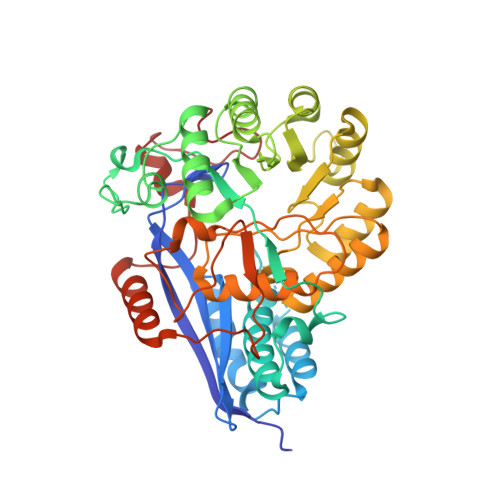Evolution of enzymatic activities in the enolase superfamily: crystallographic and mutagenesis studies of the reaction catalyzed by D-glucarate dehydratase from Escherichia coli.
Gulick, A.M., Hubbard, B.K., Gerlt, J.A., Rayment, I.(2000) Biochemistry 39: 4590-4602
- PubMed: 10769114
- DOI: https://doi.org/10.1021/bi992782i
- Primary Citation of Related Structures:
1EC7, 1EC8, 1EC9, 1ECQ - PubMed Abstract:
D-Glucarate dehydratase (GlucD) from Escherichia coli catalyzes the dehydration of both D-glucarate and L-idarate as well as their interconversion via epimerization. GlucD is a member of the mandelate racemase (MR) subgroup of the enolase superfamily, the members of which catalyze reactions that are initiated by abstraction of the alpha-proton of a carboxylate anion substrate. Alignment of the sequence of GlucD with that of MR reveals a conserved Lys-X-Lys motif and a His-Asp dyad homologous to the S- and R-specific bases in the active site of MR. Crystals of GlucD have been obtained into which the substrate D-glucarate and two competitive inhibitors, 4-deoxy-D-glucarate and xylarohydroxamate, could be diffused; D-glucarate is converted to the dehydration product, 5-keto-4-deoxy-D-glucarate (KDG). The structures of these complexes have been determined and reveal the identities of the ligands for the required Mg(2+) (Asp(235), Glu(266), and Asn(289)) as well as confirm the expected presence of Lys(207) and His(339), the catalytic bases that are properly positioned to abstract the proton from C5 of L-idarate and D-glucarate, respectively. Surprisingly, the C6 carboxylate group of KDG is a bidentate ligand to the Mg(2+), with the resulting geometry of the bound KDG suggesting that stereochemical roles of Lys(207) and His(339) are reversed from the predictions made on the basis of the established structure-function relationships for the MR-catalyzed reaction. The catalytic roles of these residues have been examined by characterization of mutant enzymes, although we were unable to use these to demonstrate the catalytic independence of Lys(207) and His(339) as was possible for the homologous Lys(166) and His(297) in the MR-catalyzed reaction.
Organizational Affiliation:
Department of Biochemistry, University of Wisconsin, Madison, Wisconsin 53705, USA.
















